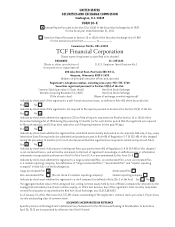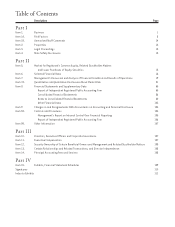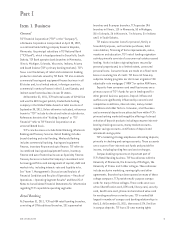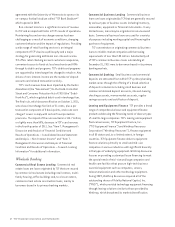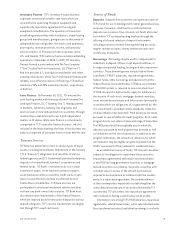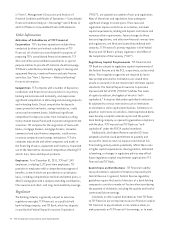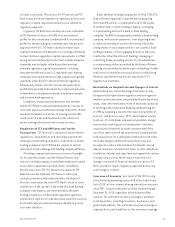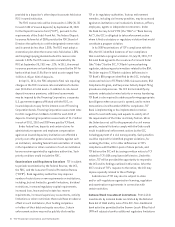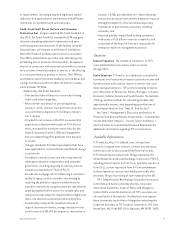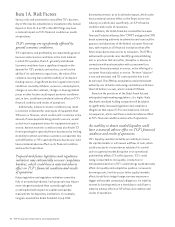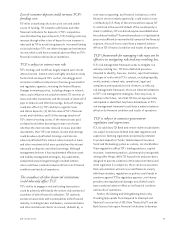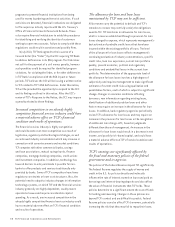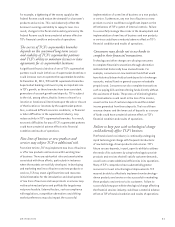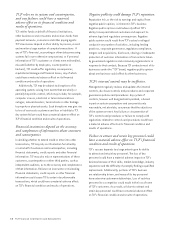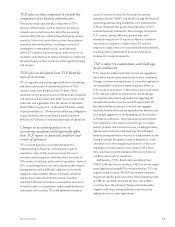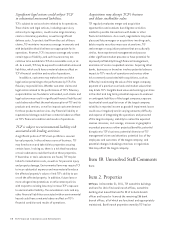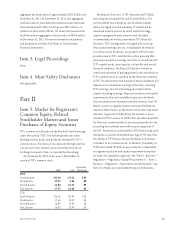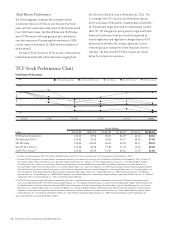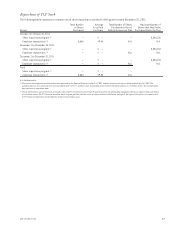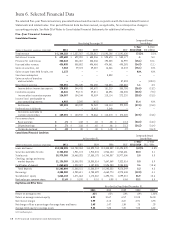TCF Bank 2011 Annual Report Download - page 26
Download and view the complete annual report
Please find page 26 of the 2011 TCF Bank annual report below. You can navigate through the pages in the report by either clicking on the pages listed below, or by using the keyword search tool below to find specific information within the annual report.Item 1A. Risk Factors
Various risks and uncertainties may affect TCF’s business.
Any of the risks described below or elsewhere in this Annual
Report on Form 10-K or TCF’s other SEC filings may have
a material impact on TCF’s financial condition or results
of operations.
TCF’s earnings are significantly affected by
general economic conditions.
TCF’s operations and profitability are impacted by general
business and economic conditions in the local markets
in which TCF operates, the U.S. generally and abroad.
Economic conditions have a significant impact on the
demand for TCF’s products and services, as well as the
ability of its customers to repay loans, the value of the
collateral securing loans and the stability of its deposit
funding sources. A significant decline in general economic
conditions caused by inflation, recession, unemployment,
changes in securities markets, changes in housing market
prices or other factors could impact economic conditions
and, in turn, could have a material adverse effect on TCF’s
financial condition and results of operations.
Additionally, adverse economic conditions may result
in a decline in demand for some types of equipment that
TCF leases or finances, which could result in a decline in the
amount of new equipment being placed in service, as well
as declines in equipment values for equipment already in
service. Adverse economic conditions may also hinder TCF
from expanding the specialty finance businesses by limiting
its ability to attract and retain customers as expected. Any
such difficulties in TCF’s specialty finance businesses could
have a material adverse effect on its financial condition
and results of operations.
Proposed and future legislative and regulatory
initiatives may substantially increase compliance
burdens, which could have a material adverse
effect on TCF’s financial condition and results
of operations.
Future legislative and regulatory initiatives cannot be
fully or accurately predicted. Such proposals may impose
more stringent standards than currently applicable
or anticipated with respect to capital and liquidity
requirements for depository institutions. For example,
Congress enacted the Dodd-Frank Act in July 2010.
Uncertainty remains as to its ultimate impact, which could
have a material adverse effect on the financial services
industry as a whole and, specifically, on TCF’s financial
condition and results of operations.
In addition, the Dodd-Frank Act created the Consumer
Financial Protection Bureau (the “CFPB”) and gave the CFPB
broad rulemaking authority to administer and carry out the
purposes and objectives of the federal consumer financial
laws, with respect to all financial institutions that offer
financial products and services to consumers. The CFPB is
authorized to prescribe rules identifying and prohibiting
acts or practices that are unfair, deceptive or abusive in
connection with any transaction with a consumer for a
consumer financial product or service, or the offering of a
consumer financial product or service. The term “abusive”
is new and untested, and TCF cannot predict how it will
be enforced. The CFPB has examination and enforcement
authority over all banks and savings institutions with more
than $10 billion in assets, which includes TCF Bank.
Based on the provisions of the Dodd-Frank Act and
anticipated implementing regulations, it is highly likely
that banks and bank holding companies will be subject
to significantly increased regulation and compliance
obligations that expose TCF to noncompliance risk and
consequences, which could have a material adverse effect
on TCF’s financial condition and results of operations.
An inability to obtain needed liquidity could
have a material adverse effect on TCF’s financial
condition and results of operations.
TCF’s liquidity could be limited by an inability to access
the capital markets or unforeseen outflows of cash, which
could arise due to circumstances outside of its control
such as a general market disruption or an operational
problem that affects TCF or third parties. TCF’s credit
rating is important to its liquidity. A reduction or
anticipated reduction in TCF’s credit ratings could adversely
affect its liquidity and competitive position, increase its
borrowing costs, limit its access to the capital markets,
affect its ability to hedge foreign currency exposure or
trigger unfavorable contractual obligations. An inability
to meet its funding needs on a timely basis could have a
material adverse effect on TCF’s financial condition and
results of operations.
8 TCF Financial Corporation and Subsidiaries



